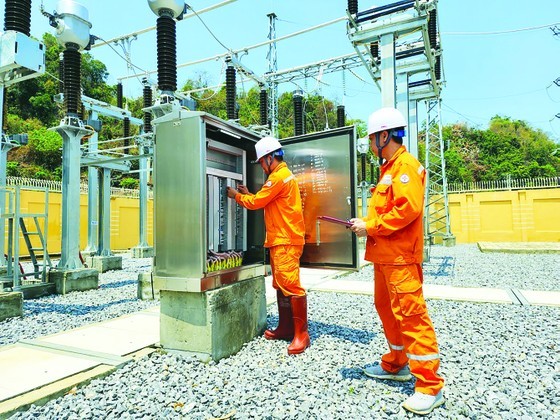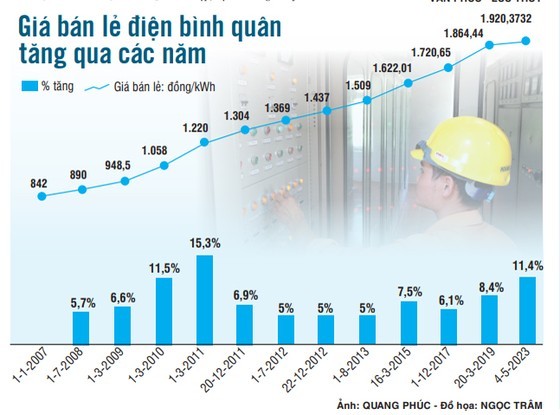
EVN employees check the operation of the power grid.
With the recent hike in electricity prices, people and businesses need to use energy cost-effectively and efficiently. Meanwhile, the government needs to regulate prices to prevent any opportunistic behavior that could negatively impact people's lives and livelihoods.
Commodities will be affected
Assoc. Prof-Dr. Ngo Tri Long, former Deputy Director of the Institute for Price Market Research under the Ministry of Finance, has stated that electricity is a crucial commodity that has a significant impact on people's daily lives. The recent increase in electricity prices is expected to affect both production and consumption directly and indirectly. Industries that heavily rely on electricity, such as chemical and metallurgical industries, are likely to be affected as soon as the electricity prices go up. Moreover, the increase in electricity prices may lead to commodity price hikes in the market.
"In my opinion, the inflation index will rise as soon as electricity prices increase. The impact will be felt both directly and indirectly, and it may lead to opportunistic behavior that drives up prices across a range of other commodities," predicted Mr. Long.
A textile factory owner in La Ca Village, Duong Noi Ward, Ha Dong District Hanoi, also shared their concern in an interview with a reporter from SGGP Newspaper. They stated that the adjustment of electricity prices would increase the costs for households and production facilities that rely heavily on electricity, which is a significant challenge in the current economic climate.
Some workers at the Bac Thang Long - Noi Bai Industrial Park in Hanoi are also expressing concerns over the increase in electricity prices. Bui Thi Nga, a textile worker from Quoc Oai District in Hanoi, who works at the Bac Thang Long - Noi Bai Industrial Park, expressed her worries that the electricity prices in the boarding house areas are already much higher than EVN's regulated price, with some places charging VND3,500 per kWh or VND3,800 per kWh. If the electricity prices climb, it will certainly have an impact on their already low salaries, and life and livelihoods will become even more challenging.
Reasonable use of energy is necessary
On March 31, the Ministry of Industry and Trade announced the results of their inspection of EVN's electricity production and business costs for 2021 and 2022. The results showed that the production and business costs of EVN's electricity in 2022 are VND2,032.26 per kWh, an increase of 9.27 percent compared to 2021.

Average retail electricity price of EVN over the years.
Meanwhile, according to Decision No.24/2017/QD-TTg dated June 30, 2017, by the Prime Minister regarding the mechanism for adjusting the average retail electricity price, the electricity sector is evaluated and proposes adjustments to the average retail electricity price once a year. However, from 2019 up until May 4, 2023, the electricity prices have not been adjusted.
Decision No.24/2017/QD-TTg also clearly states that if the input costs of the electricity industry increase (or decrease) by 3 percent or more, EVN is allowed to adjust the corresponding retail electricity price. However, in this adjustment, EVN was only allowed to increase the average retail price by 3 percent to avoid causing a shock to the economy.
According to Mr. Nguyen Bich Lam, former Director General of the General Statistics Office under the Ministry of Planning and Investment, with a cost increase of 9.27 percent without a timely adjustment of electricity prices, EVN incurred losses of over VND26.4 trillion in 2022. In the first quarter alone, EVN is estimated to continue to suffer a loss of VND18.4 trillion. If the average retail electricity price is not adjusted in a timely and appropriate manner, the total accumulated losses of 2022 and 2023 are expected to reach about VND68.7 trillion. This will have an impact on the State's capital preservation at EVN, the ability to supply electricity to the economy, and national energy security in the context of climate change and the El Nino phenomenon, which is driving up demand for electricity in the economy.
Mr. Nguyen Bich Lam argues that as electricity prices increase, businesses will have to restructure their expenses to reduce the cost of their products and use energy more efficiently and thriftily. This will also encourage their energy transition process by investing in solar power systems to supply electricity for production on their own.